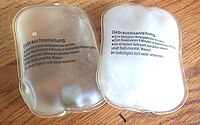
Photo from wikipedia
Recently, renewable sources of energy, particularly, solar thermal energy, have gained significant attention for developing heating and cooling mechanisms for buildings. This work aims at developing a theoretical model for… Click to show full abstract
Recently, renewable sources of energy, particularly, solar thermal energy, have gained significant attention for developing heating and cooling mechanisms for buildings. This work aims at developing a theoretical model for space heating based on phase change material (PCM) using solar energy in winter conditions for the Northern region of India. The system has two PCM containers placed inside the room on the two opposite walls, which receives heat from concentrating solar system during the daytime. After achieving the temperature of PCM above its melting point using the solar system, the stored heat of PCM is released to the room ambient during the nighttime when the room ambient is at lower temperature. OM-37, having melting temperature of [Formula: see text]C, has been used as a PCM for the current research work. The numerical investigation of the system shows that temperature of the room reaches to 26–[Formula: see text]C from [Formula: see text]C in 4–5[Formula: see text]h of operation and thus ensuring thermal comfort of occupants.
Journal Title: International Journal of Air-Conditioning and Refrigeration
Year Published: 2020
Link to full text (if available)
Share on Social Media: Sign Up to like & get
recommendations!